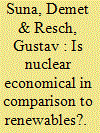| Srl | Item |
| 1 |
ID:
088055


|
|
|
|
|
| Publication |
2009.
|
| Summary/Abstract |
The European Commission has proposed a new Renewable Energy Directive, which includes flexibility provisions allowing the cost-effective attainment of the ambitious target for renewable energy of 20% of energy consumption, which has been set for the year 2020. One of the flexibility provisions currently being considered is to allow countries to reach their individual targets by buying their renewable electricity deployment deficit from other countries with a surplus (i.e., with a renewable electricity deployment above their targets). This trade is likely to take the form of an exchange in guarantees of origin (GOs). GOs are currently implemented in Member States to fulfil the Renewable Electricity Directive requirement that each country has a system that allows the tracing of the source of each kWh of renewable electricity and informs on this source. Although the recent and tiny literature on the analysis of GO trading has focused on trade between firms, the exchange of GOs between governments has not received a comparable attention. This paper analyses the advantages and drawbacks of a system of government trading of GOs with respect to company trading.
|
|
|
|
|
|
|
|
|
|
|
|
|
|
|
|
| 2 |
ID:
097492


|
|
|
|
|
| Publication |
2010.
|
| Summary/Abstract |
In June 2009, a new EU directive on the promotion of renewable energy sources (RES) entered into effect. The directive 2009/28/EC, provides for three cooperation mechanisms that will allow member states to achieve their national RES target in cooperation with other member states: statistical transfer, joint projects, and joint support schemes. This article analyses the pros and cons of the three mechanisms and explores design options for their implementation through strategic and economic questions: How to counterbalance the major drawbacks of each mechanism? How to reflect a balance of costs and benefits between the involved member states? The analysis identifies a number of design options that respond to these questions, e.g. long term contracts to ensure sufficient flexibility for statistical transfers, a coordinated, standardised joint project approach to increase transparency in the European market, and a stepwise harmonisation of joint support schemes that is based on a cost-effective accounting approach. One conclusion is that the three cooperation mechanisms are closely interlinked. One can consider their relation to be a gradual transition from member state cooperation under fully closed national support systems in case of statistical transfers, to cooperation under fully open national support systems in a joint support scheme.
|
|
|
|
|
|
|
|
|
|
|
|
|
|
|
|
| 3 |
ID:
149902


|
|
|
|
|
| Summary/Abstract |
The European Union is divided on the issue of electricity production. While there is consensus that generation technologies need to be low on greenhouse gas emissions, the question of whether to use renewables or nuclear to meet this power demand is highly controversial. Both options still require financial support and this is not going to change in the near future. This raises the question of where public money should be invested in order to achieve greater economic efficiency: into support for renewable energies (RE) or support for nuclear power plants?
|
|
|
|
|
|
|
|
|
|
|
|
|
|
|
|